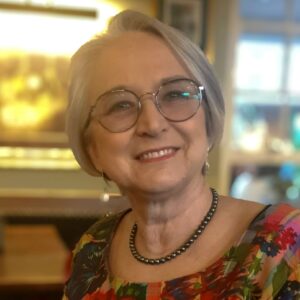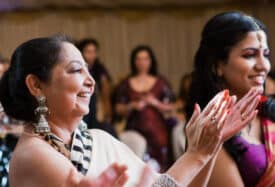What does it mean to be death positive?

Anna Wilde, a PhD student based at the University of Birmingham, shares what it means to be death positive, and how talking about and preparing for death can enrich our lives, reminding us to be grateful for each day we have.
If you have come across the term ‘death positive’, perhaps on social media, you might wonder what on earth it means. After all, we know that we’re going to die and so is everyone that we care about – what is there to be positive about? And who came up with the idea, anyway?
Caitlin Doughty, the founder of the Death Positive Movement (DPM), attributes the start of the movement to asking on Twitter (now X) in 2013: “Why are there a zillion websites and references to being sex positive and nothing for being death positive?” She explained that by “death positive”, she means: “I am fascinated by death, the history of death, how cultures around the world handle death, my own relationship to mortality, and I refuse to be ashamed of that interest”.
The tweet attracted suggestions that a new movement should be formed, and Doughty, who was running her own mortuary services in Los Angeles at the time, became the founder of the Order of the Good Death, which she started with the collaboration of several other women. Doughty also set up the hugely popular @AskAMortician YouTube channel, which now has over 2.1 million subscribers; the collection spans 11 years and numbers 270 videos. She also has a large following on Instagram and other social media channels, delivers talks at death-related events worldwide and has authored three books. Through these methods, the concept of the DPM has spread and is now active in the US, Canada, the UK, Australia and New Zealand, and growing within Europe.
However, death positivity isn’t about rejoicing when someone dies, or looking forward with glee to our own final moments. It’s much more about viewing death as a natural part of life and accepting the fact that, no matter what we do to avoid it, death is inevitable for us all. People who call themselves death positive will vary in their beliefs and behaviours, but most will talk easily and naturally about death, and encourage those around them to do the same. They will suggest that everyone should have paperwork in place and share it with their family, so that when they die, all the required items such as wills, funeral wishes and financial information is readily at hand. Some death positive practitioners, such as people who work within end-of-life care or death doulas, encourage a death plan, sometimes called a ‘living will’ or ‘advance directive’ to be made, which detail your wishes on resuscitation and refusal of treatment.
But as well as these practical issues, at the heart of the DPM is the desire for everyone to have access to a ‘good death’.
Defining what constitutes a good death is difficult as it’s a very personal thing – what does it mean to die well? A hundred years ago, most people died at home, but nowadays in the UK, only about 30% of deaths occur outside of a hospital, hospice or care home, although interestingly these numbers are rising.
For my research, I interviewed people who identified as death positive on this subject, and most agreed that feeling some element of choice and control over their manner and place of death was important to them; for example, choosing not to be sedated, if possible. Of course, death, rather like birth, does not always stick to the script we give it, but it is still useful to think through our preferences. Circumstances can deprive us of choices, whether those circumstances arise due to poverty, isolation or other factors, and the Order of the Good Death advocates for people’s wishes to be honoured, regardless of their race, gender or sexual orientation.
Within the UK, adherents of the DPM are quietly working to help make dying a natural part of people’s lives. When I tell people I study death, they are either disgusted or intrigued – and nearly everyone will say: “Of course, we don’t talk about death”. I usually ask them to consider whether that oft-repeated phrase is actually still true. Across the country (and indeed, the world) Death Cafés are held regularly, where people come to explore their feelings on death, dying, grief and bereavement. Whether it’s fear of dying, the loss of a pet, the death of a beloved partner, or just plain interest, many people find great relief in discussing these things – and of course, there’s always plenty of tea and cake. There are also Death Positive Libraries, who can loan books on death such as With the End in Mind by Dr Kathryn Mannix, or Nine Rules to Conquer Death by Kevin Toolis (and many more). Various podcasts on death abound, including the award-winning Griefcast, with Radio 4 presenter Cariad Lloyd, and Where There’s a Will, There’s a Wake with actor Kathy Burke. Then there’s TED talks, online festivals such as Lifting the Lid International Festival of Death and Dying, organisations such as the Good Grief Trust… all in all, too many different initiatives to mention.
Meanwhile, independent funeral directors such as Poppy’s Funerals are committed to helping their customers achieve the funeral wishes of their loved ones. They encourage a personalised, rather than a packaged, approach and will assist you in carrying out after-death care on your relative if you would like to, by washing and dressing them. This individual approach is also seen in the funeral celebrants who will design and host a funeral alongside you, and in the many natural burial grounds that favour an eco-friendly method of body disposal, often involving cardboard or wicker coffins or woven woollen shrouds.
To end on a personal note, the reasons I began studying death were connected to my mother’s illness of being in a catatonic state with dementia for over ten years. This followed a serious road accident where I was permanently disabled. There was a lot of loss and grief surrounding both these events, and my mother’s eventual death brought some relief as I could finally remember her how she used to be, rather than how her illness had affected her. I became interested in death and its many different aspects, which led to my Masters and then PhD studies. I consider myself to be death positive, although I still fear dying, especially as I get older and closer to it! I’ve met some fascinating people through my studies, all of whom have given me different perspectives on death, which is truly multi-dimensional. From cultural perspectives to religion, body disposal to death in art, literature and the media, my work at Caring for God’s Acre and with CEDAR Education (Community Education in Death Awareness & Resources), turning to death has been very life-enhancing for me. None of us are guaranteed our tomorrows and I find talking about death and preparing for it also reminds me to be grateful for every day we have left on this beautiful earth.

Anna Wilde is researching the Death Positive Movement for her PhD at the University of Birmingham. She holds an MA in Death, Religion and Culture and works for Caring for God’s Acre, a charity that supports the environmental and built heritage of burial grounds across the UK. Anna is also a Director of CEDAR Education, which is a non-profit company working in the field of death education.
- Website: deathpositiveresearch.com
- X: @Another_Shore
There’s much more to death than we think; what if it isn’t just an ending, but an event we can plan for? Thinking beyond the four walls of hospices and hospitals, we have the chance to approach it with confidence and plan a good death. After Wards is a collection of insights and ideas from people who can help us all to re-imagine this essential part of life, and to live well until we die.


